If you’re looking for a unique and meaningful way to express your feelings, consider the secret language of leaves.
Plants with heart-shaped leaves have long been associated with love, affection, and deep emotions.
These plants are not only beautiful, but they also have a rich history and symbolism that make them a perfect gift for someone special.
From indoor to outdoor plants, there are many varieties of plants with heart-shaped leaves that you can choose from.
Some of the most popular indoor plants with heart-shaped leaves include:
- String of Hearts (Ceropegia woodii)
- Heartleaf Philodendron (Philodendron hederaceum)
- Chinese Evergreen (Aglaonema spp.)
- Arrowhead Plant (Syngonium podophyllum)
- Peace Lily (Spathiphyllum spp.)
These plants not only add a touch of greenery to your home, but they also serve as a reminder of your love and affection for those around you.
Outdoor plants with heart-shaped leaves include:
- Bleeding Heart (Dicentra spectabilis)
- Heartleaf Philodendron (Philodendron hederaceum)
- Cyclamen (Cyclamen persicum)
- English Ivy (Hedera helix)
- Sweetheart Hoya (Hoya kerrii)
Whether you’re looking for a gift for someone special or simply want to add some symbolism to your home or garden, plants with heart-shaped leaves are a beautiful and meaningful choice.
What are Plants with Heart-Shaped Leaves?
One of the reasons why plants with heart-shaped leaves are so popular is their unique appearance. The shape of the leaves is instantly recognizable, and can add a touch of whimsy and romance to any space.
Additionally, many of these plants are easy to care for, making them a great choice for beginners or those with limited gardening experience.
Another interesting aspect of plants with heart-shaped leaves is their symbolism. In many cultures, heart-shaped leaves are seen as a symbol of love, passion, and devotion.
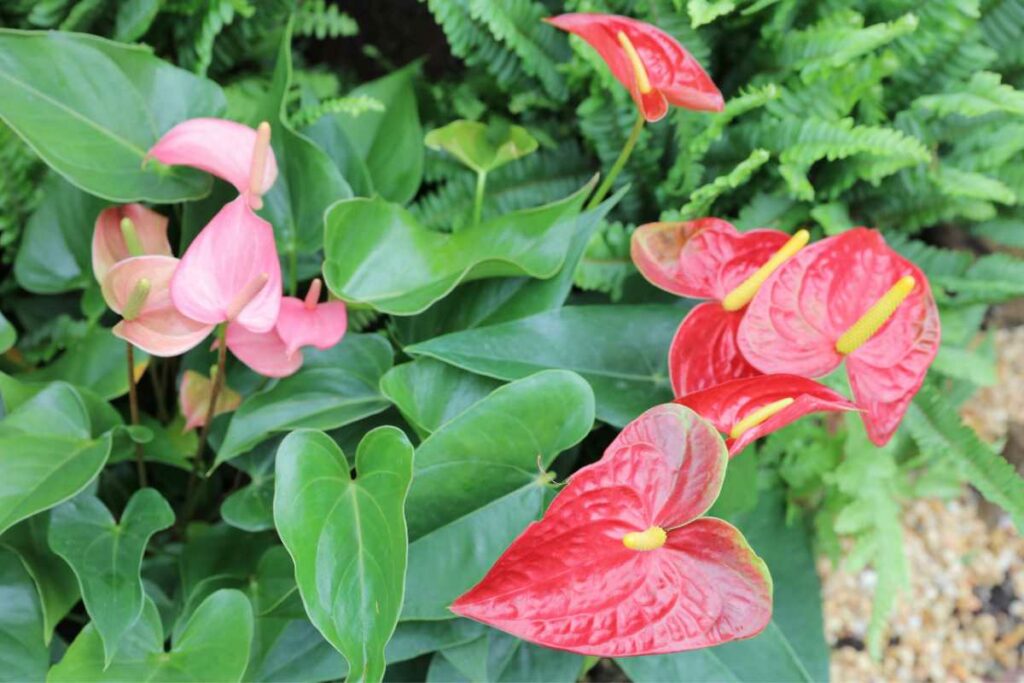
Some people even believe that these plants can communicate secret messages through the language of leaves.
For example, giving someone a Sweetheart Plant may be seen as a sign of affection, while a Bleeding Heart plant may represent heartbreak or loss.
Symbolism and Meanings
Love and Affection
Plants with heart-shaped leaves are often associated with love and affection. The heart shape is a universal symbol of love and passion, making these plants a perfect gift for your loved ones.
Some of the most popular plants with heart-shaped leaves that symbolize love and affection include the Hoya Heart, String of Hearts, and the Heartleaf Philodendron.
Friendship and Loyalty
Plants with heart-shaped leaves also symbolize friendship and loyalty. These plants are a great way to show your friends how much you appreciate them.
The Pilea Peperomioides, also known as the Chinese Money Plant, is a popular plant with heart-shaped leaves that symbolizes friendship and loyalty.
This plant is easy to care for and can be propagated easily, making it a great gift for your friends.
Spirituality and Healing
Plants with heart-shaped leaves also have spiritual and healing meanings. These plants are believed to have the power to heal and bring positive energy into your life.
The Oxalis Triangularis, also known as the Purple Shamrock, is a popular plant with heart-shaped leaves that symbolizes spirituality and healing.
This plant is believed to bring good luck and positive energy into your home. In summary, plants with heart-shaped leaves have deep meanings and symbolism.
They are perfect gifts for your loved ones, friends, and even for yourself. These plants not only add beauty to your home but also bring positive energy and healing.
Types of Plants with Heart Shaped Leaves
Below are some of the most popular types of plants with heart-shaped leaves, split into three sub-sections: Indoor Plants, Outdoor Plants, and Herbs and Spices.
Indoor Plants
Indoor plants with heart-shaped leaves are perfect for adding a touch of greenery to your home or office. Some popular indoor plants with heart-shaped leaves include:
Valentine Plant – Heartleaf Philodendron

Valentine Plant is a common name for the Anthurium andraeanum, a tropical plant native to Central and South America.
It is known for its heart-shaped, glossy leaves and bright red, heart-shaped flowers that bloom year-round.
The plant prefers bright, indirect light and moist, well-draining soil. It is often grown as a houseplant and is popular during the Valentine’s Day season due to its heart-shaped flowers.
The plant is also known for its air-purifying properties, making it a great choice for improving indoor air quality.
String of Hearts
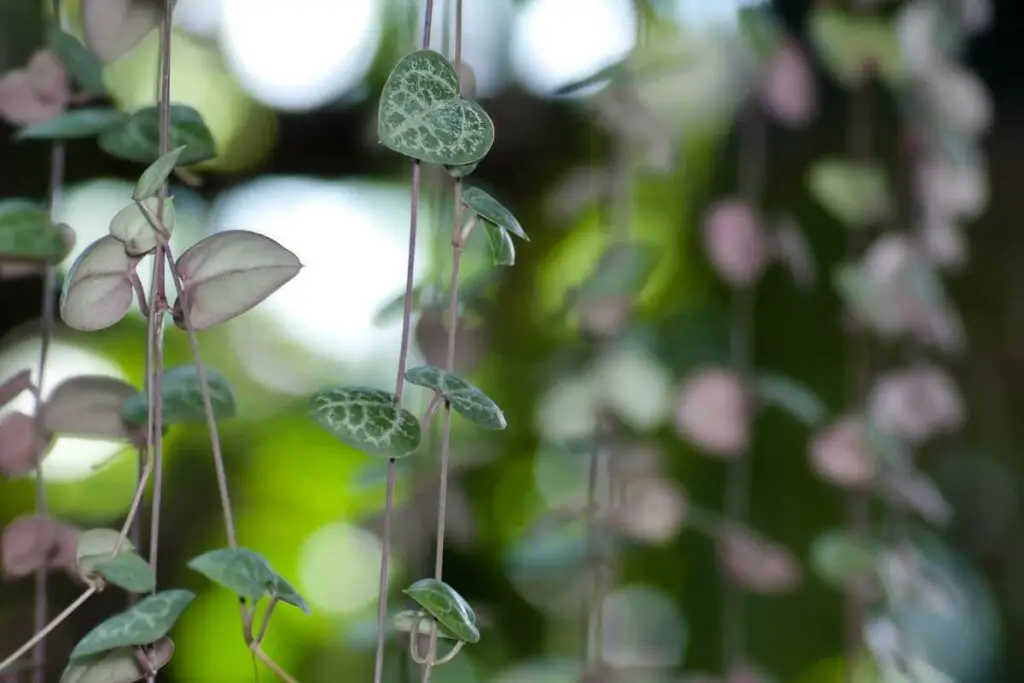
String of Hearts, also known as Ceropegia woodii, is a popular trailing plant that is native to South Africa.
It is known for its delicate, heart-shaped leaves that grow on long, thin stems, giving it a cascading appearance. The leaves are typically green with silver markings, and the plant can produce small, tubular flowers in the summer months.
String of Hearts is a low-maintenance plant that prefers bright, indirect light and well-draining soil.
It is often grown in hanging baskets or trained to climb a trellis, and its cascading foliage makes it a great choice for adding interest to a room or outdoor space.
Arrowhead plant
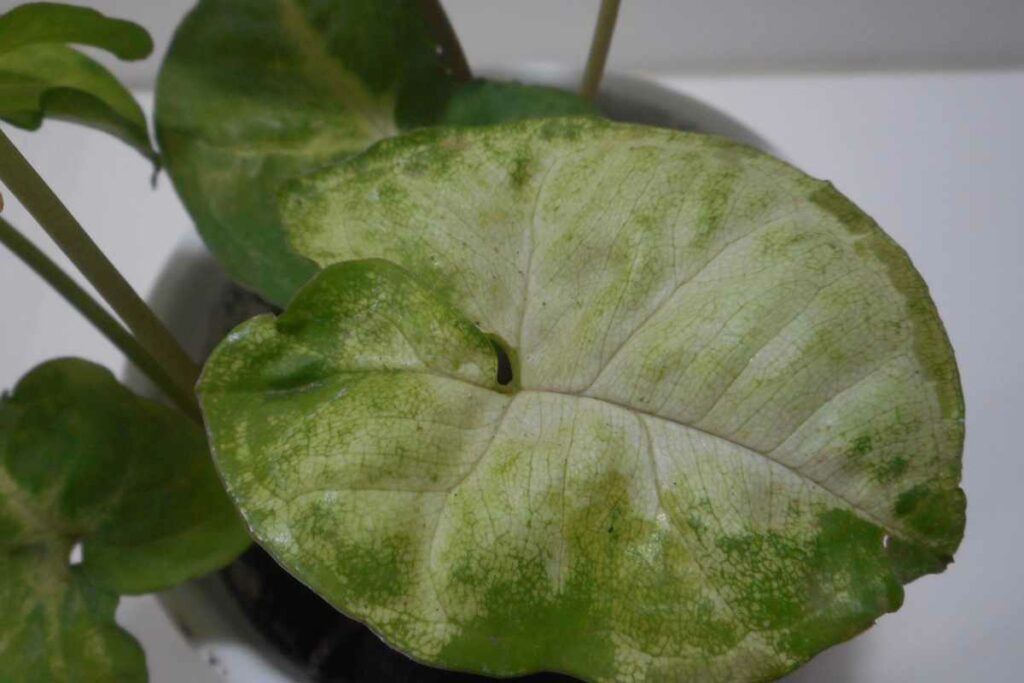
This plant is also known as Syngonium podophyllum and has arrowhead-shaped leaves that are heart-shaped at the base. It is a popular houseplant because it is easy to care for and can tolerate low light.
Chinese Evergreen
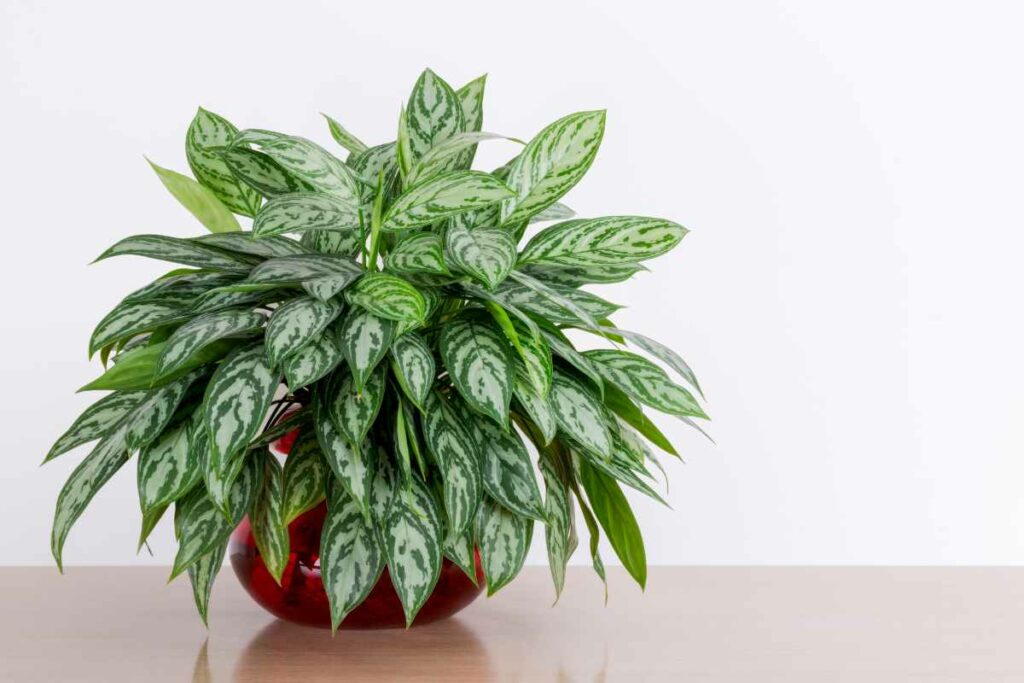
The Chinese Evergreen, also known as Aglaonema, is a tropical plant that is native to Southeast Asia. It is a low-maintenance plant that can thrive in low light conditions and doesn’t require frequent watering.
Its leaves are typically green with silver or white markings, but there are also varieties with pink, red, or yellow hues.
The plant is also known for its air-purifying properties, making it a great choice for improving indoor air quality. Because of its versatility and easy care, the Chinese Evergreen is a popular choice for both novice and experienced indoor gardeners.
Heartleaf Philodendron
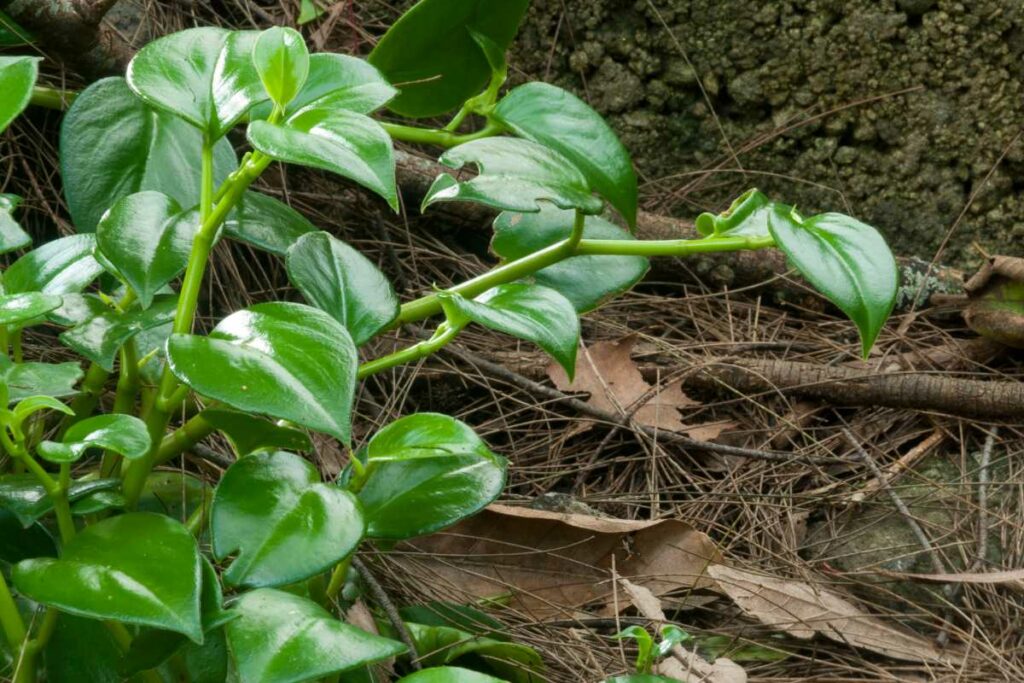
The Heartleaf Philodendron is a popular indoor plant that is native to Central and South America.
It is a vining plant with heart-shaped leaves that can grow up to 3 feet long, making it an excellent choice for hanging baskets or trained to climb a trellis.
It is also known for its air-purifying properties and is easy to care for, making it a great choice for beginner plant enthusiasts.
Outdoor Plants
Outdoor plants with heart-shaped leaves are perfect for adding a touch of romance to your garden. Some popular outdoor plants with heart-shaped leaves include:
Bleeding Heart
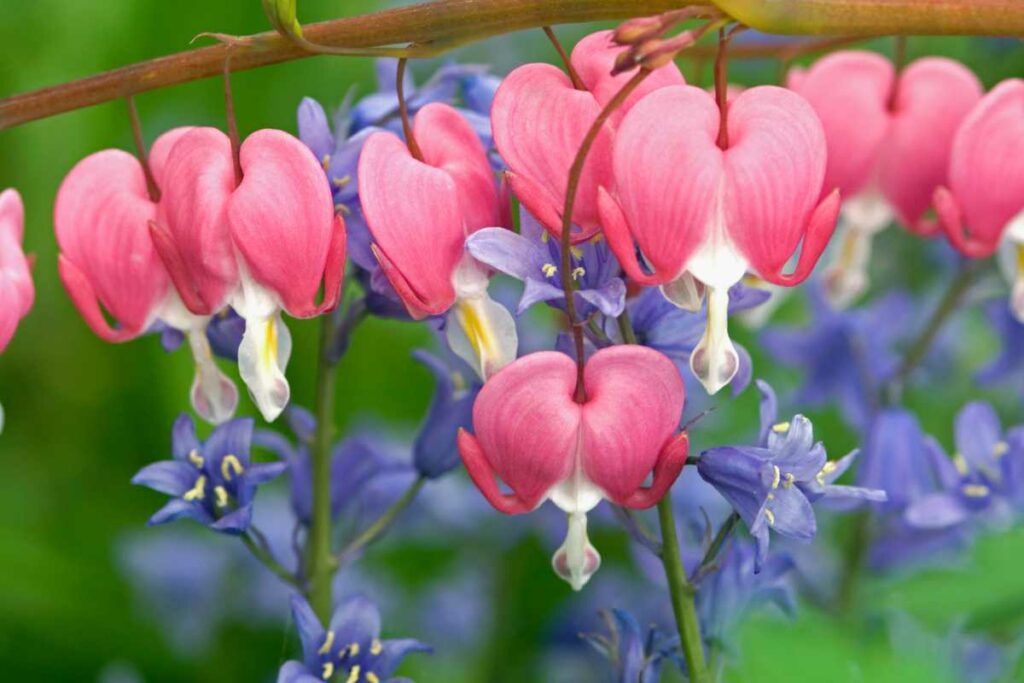
Bleeding Heart, also known as Dicentra spectabilis, is a popular spring-blooming plant that is native to Asia.
It is known for its delicate, heart-shaped pink or white flowers that hang from arching stems. The plant prefers cool, moist conditions and partial shade, making it a great choice for woodland gardens or shady borders.
Bleeding Heart is a long-lived perennial that can grow up to 3 feet tall and wide, and its foliage typically dies back in the summer months.
The plant is also deer-resistant and attracts pollinators, making it a great addition to any garden.
Jack Frost
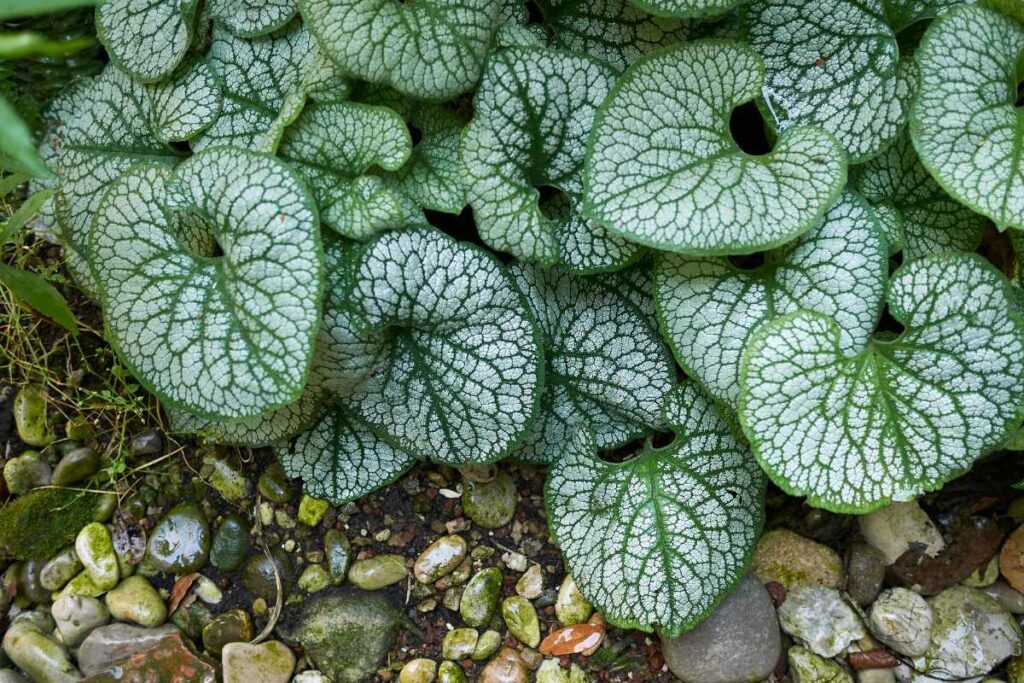
Jack Frost is a cultivar of the plant Brunnera macrophylla, also known as Siberian Bugloss. It is a shade-loving plant that is known for its heart-shaped leaves, which are silver with green veins.
The leaves are fuzzy to the touch, giving the plant a soft, delicate appearance. Jack Frost blooms in the spring with small, sky-blue flowers that add to its overall charm.
It is a low-maintenance plant that is easy to grow and is often used in shade gardens, woodland gardens, or as a ground cover.
Hostas
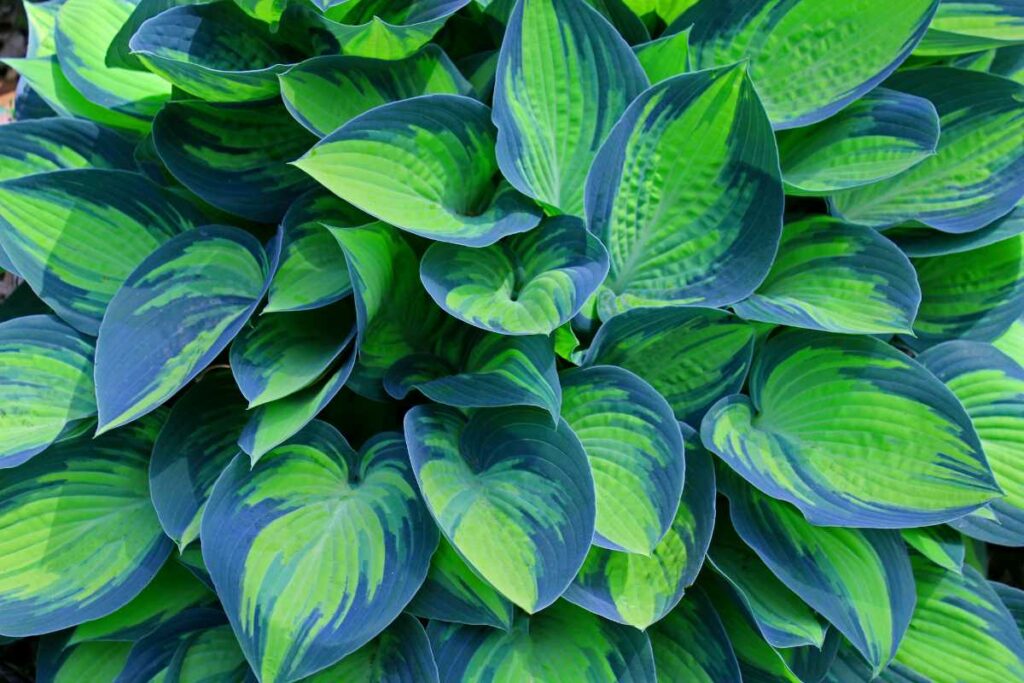
Hostas are a popular shade-loving plant that are native to East Asia. They are known for their large, heart-shaped leaves that come in a range of colors, including green, blue, and variegated.
Hostas are easy to care for and can thrive in a variety of soil types, making them a great choice for beginner gardeners.
They also produce attractive flowers that bloom in the summer months, adding to their overall appeal.
Hostas are a versatile plant that can be used in a variety of garden settings, including as ground cover, edging, or as a focal point in a shade garden.
Sweetheart Hoya
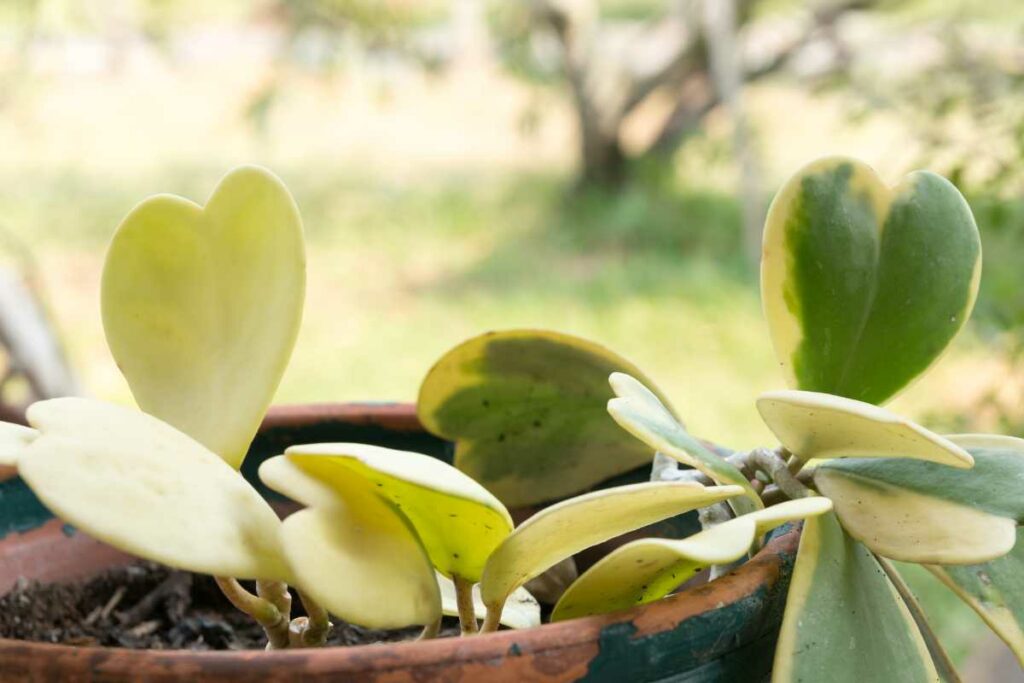
Sweetheart Hoya, also known as Hoya kerrii, is a popular indoor plant that is native to Southeast Asia. It is known for its heart-shaped leaves that can range in color from light green to dark green.
The plant is a slow-growing vine that can be trained to climb a trellis or allowed to trail over the edges of a pot.
Sweetheart Hoya is a low-maintenance plant that prefers bright, indirect light and infrequent watering.
It is also a popular gift plant, as its heart-shaped leaves are often seen as a symbol of love and affection.
Cyclamen
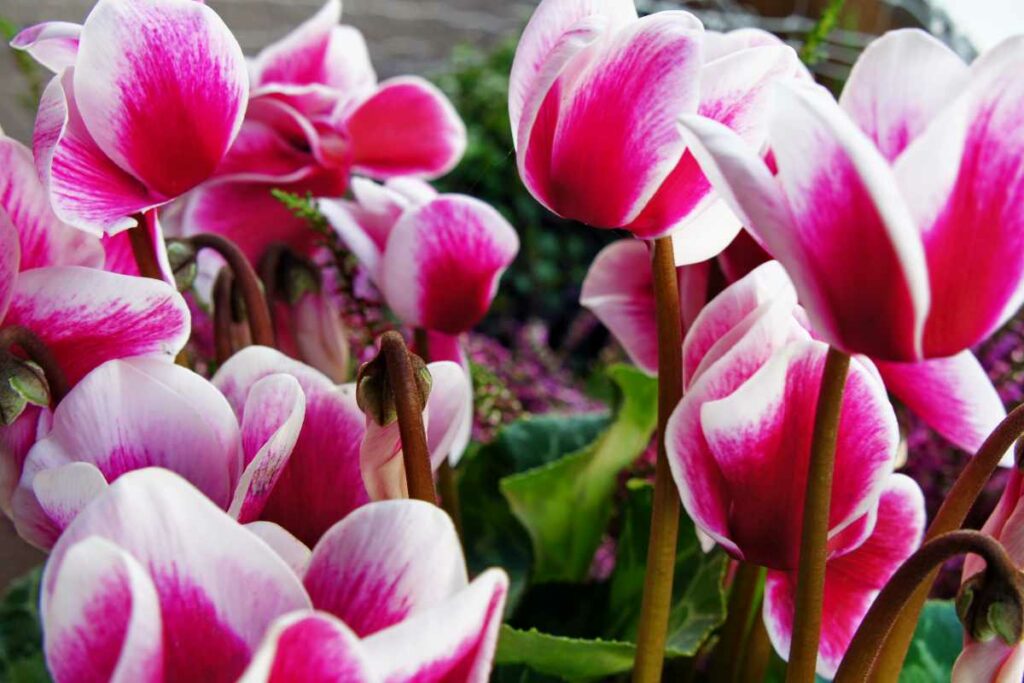
Cyclamen is a popular indoor plant that is known for its beautiful, delicate flowers and attractive foliage.
It is native to the Mediterranean region and is often grown as a houseplant in cooler climates. Cyclamen plants have heart-shaped leaves that are typically green with silver or white markings, and their flowers come in a range of colors, including pink, red, white, and purple.
Cyclamen plants prefer cool temperatures and bright, indirect light, making them a great choice for adding a pop of color to your indoor garden during the winter months.
Herbs and Spices with Heartshaped Leaves
Herbs and spices with heart-shaped leaves are perfect for adding flavor to your cooking. Some popular herbs and spices with heart-shaped leaves include:
- Basil: This herb is a popular choice for Italian dishes and has heart-shaped leaves that are a bright green color. It is easy to grow and can be used fresh or dried.
- Parsley: This herb is a popular garnish and has heart-shaped leaves that are a bright green color. It is also used in many dishes, including soups, stews, and salads.
- Cilantro: This herb is a popular choice for Mexican dishes and has heart-shaped leaves that are a bright green color. It is also used in many Asian and Indian dishes.
How to Care for Plants with Heart-Shaped Leaves
Watering and Fertilizing Tips
When it comes to watering plants with heart-shaped leaves, it’s important to strike a balance between keeping the soil moist and avoiding overwatering.
Overwatering can lead to root rot, which can be fatal for plants. Make sure to let the soil dry out slightly between waterings, but don’t let it become bone dry.
Top pick
Miracle-Gro Indoor Plant Food Spikes
Easy-to-use fertilizer for all indoor plants including ferns, spider plants, pothos, and plants with heart-shaped leaves
Editor’s choice
Miracle-Gro Indoor Plant Food
Miracle-Gro Indoor Plant Food is great for use on all indoor plants, including edibles.
In terms of fertilizing, a balanced, water-soluble houseplant fertilizer mixed at a rate of ¼ teaspoon (1 ml.) in a gallon (4 L.) of water is plenty.
Feed the plant once a month during the growing season and discontinue feeding in winter. Avoid over-fertilizing, as this can lead to burnt roots and other problems.
Light and Temperature Requirements
Most plants with heart-shaped leaves prefer bright, indirect light. Direct sunlight can scorch the leaves, while too little light can cause the plant to become leggy and weak.
If you’re growing your plant indoors, make sure to place it near a bright window or under a grow light.
In terms of temperature, most plants with heart-shaped leaves prefer warm, humid conditions.
Keep the plant away from cold drafts and make sure to keep the humidity levels high, especially during the winter months when indoor heating can dry out the air.
Pest and Disease Control
Plants with heart-shaped leaves are generally hardy and easy to care for, but they can still fall prey to pests and diseases.
One common pest is the spider mite, which can be controlled with regular misting and by wiping down the leaves with a damp cloth.
Mealybugs and scale insects can also be a problem, and can be controlled with insecticidal soap or neem oil.
Diseases such as root rot and leaf spot can be prevented by avoiding overwatering and ensuring good air circulation around the plant. If you do notice signs of disease, remove the affected leaves or plant parts and treat with a fungicide if necessary.
Remember to always research the specific care requirements for your particular plant, as different species may have slightly different needs.
With a little care and attention, your plant with heart-shaped leaves will thrive and bring beauty to your home or garden.
Conclusion
You’ve learned about some of the most popular plants with heart-shaped leaves, both indoor and outdoor.
These plants not only add beauty to your space but also have symbolic meanings. The heart-shaped leaves represent love, affection, and friendship, making them an excellent gift for your loved ones.
When choosing plants with heart-shaped leaves, consider your space, lighting, and care requirements.
Some plants, like the Heart-Leaf Philodendron, are easy to care for and can thrive in low-light conditions, while others, like the Katsura Tree, require full sun and well-draining soil.
Whatever your preference, adding plants with heart-shaped leaves to your space is a great way to bring some greenery and positive energy into your life.
With a little care and attention, you can enjoy these beautiful plants for years to come.
